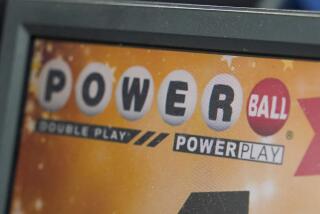Drama and strategy at Monopoly championship
- Share via
WASHINGTON — Just in time for tax season, a mortgage meltdown parable for our times. It’s got drama, it’s got desperation, it’s got soaring triumphs and splendiferous crashes. It’s got a race car, a thimble, a little Scottie and an iron no one ever seems to choose. It’s the 2009 Monopoly U.S. National Championship, held in the capital’s Union Station on April 15 and sometimes hitting close to home.
“If you don’t work with me,” calls out one exasperated player above the din of the preliminary rounds, “then those two are going to make a deal here soon and sew everything up!”
Capitalism and veiled threats dominate conversations all throughout the four-person tables in the main hall, as competitors race to achieve the game’s goal: Accumulate faux streets with faux money, build plastic houses and bankrupt all other players by charging them rent when they land on your properties.
“How far are we? Are we in the ballpark? . . . What? Do you think I’m made of gold over here?” Defending national champ Matt McNally tries to orchestrate a property trade.
“Take your time. Take your time.” Tim Vandenberg soothes the rattled guy sitting across from him. “But are you interested in [the orange-colored properties]? Because right now it’s not looking real good for you.”
Nails are bitten. Fists are pounded. Vandenberg’s dad, Tom, slides over periodically to refill his son’s water glass. Hydrate, Tim, hydrate! Hovering outside the velvet-roped partition, fans wear shirts emblazoned with a player’s face. “Adam Menendez is our Monopoly Man!” they say.
Like the Olympics, the Monopoly championship normally occurs once every four years. And $20,580 in grand-prize money -- the total funds in a standard Monopoly game -- is nothing to scoff at.
The road here has not been easy for these 28 finalists. They all passed a test on Monopoly trivia, followed by an essay exam on Monopoly theory and finally a qualifying round of Internet play.
On the way, the mighty fell. Lee Bayrd, a former world champion, barely missed the cut. He’s here anyway, to play an exhibition match and to coach another player, and he still says some of the essay questions were ludicrous.
“The questions they ask can’t be answered,” Bayrd says. “Would I rather have all the reds or all the yellows? The real answer is, well, how much time is left? How much money does my opponent have? Where is their current position on the board?”
And what about luck?
At this advanced level, with the addition of a game-complicating “speed die,” Monopoly becomes less about luck, more about strategy and personal manipulation, cajoling other players to buy, build, swap. It’s the economy as Kabuki theater -- entire housing tragedies condensed into 90-minute exercises, with exaggerated facial expressions and orange funny money.
By the championship round, the original 28 finalists have been culled to college student Brandon Baker, nonprofit worker Dale Crabtree, lawyer Richard Marinaccio and Vandenberg, a sixth-grade teacher. McNally never came out of his earlier slump, and these four finalists are all Monopoly nobodies. They take their places around a platform in the middle of the main hall, surrounded by felled players and television cameras.
Marinaccio emerges the winner, grinning and posing for pictures. He says he’ll use the money to pay off student loans.
More to Read
Go beyond the scoreboard
Get the latest on L.A.'s teams in the daily Sports Report newsletter.
You may occasionally receive promotional content from the Los Angeles Times.








